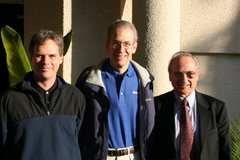 I'm very pleased to announce a two-day short course entitled Aquifer Testing for Improved Hydrogeologic Site Characterization Featuring AQTESOLV and the In-Situ LevelTROLL that will be held on August 16 and 17, 2007 in Calgary, Alberta, Canada.
I'm very pleased to announce a two-day short course entitled Aquifer Testing for Improved Hydrogeologic Site Characterization Featuring AQTESOLV and the In-Situ LevelTROLL that will be held on August 16 and 17, 2007 in Calgary, Alberta, Canada.This offering will reprise the very well-received course that we presented in Ft. Collins last year. The workshop covers both pumping tests and slug tests and combines lectures on state-of-the-art aquifer testing methods with hands-on use of AQTESOLV in the analysis of test data.
In addition to myself (Glenn Duffield, president of HydroSOLVE, Inc. and author of AQTESOLV), instructors for the course will include Jim Butler (2007 NGWA Darcy Lecturer and author of The Design, Performance, and Analysis of Slug Tests) and Chris Neville (Vice President and Senior Hydrogeologist with S.S. Papadopulos & Associates).
For more information, please visit the Midwest Geosciences Group web site. This course is offered in collaboration with Aquatic Life Ltd.












